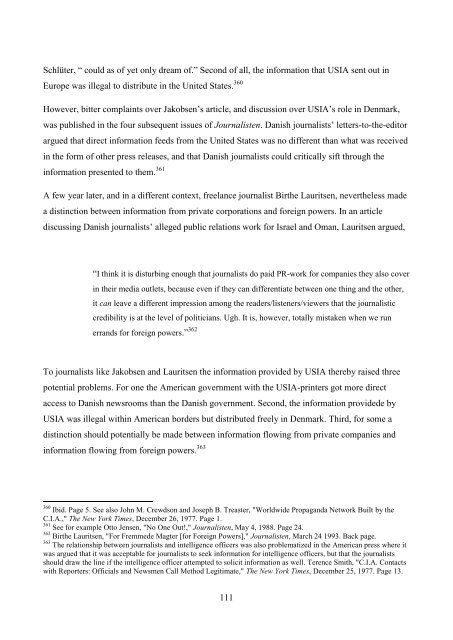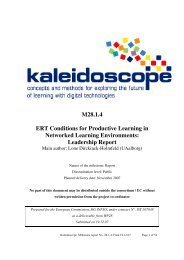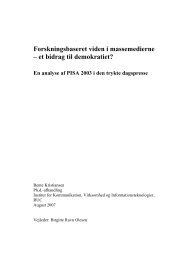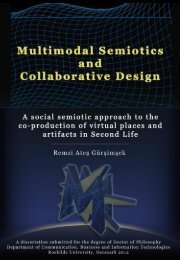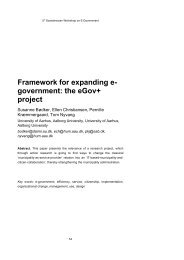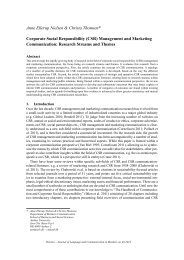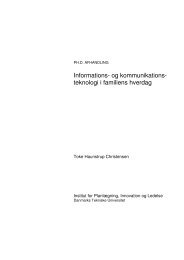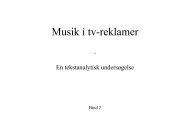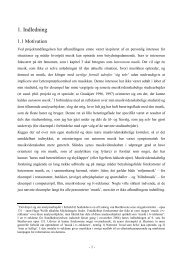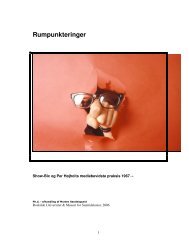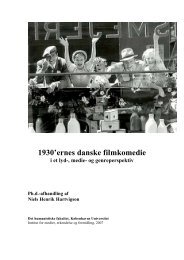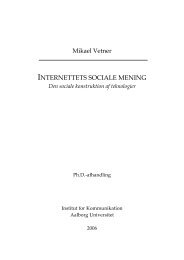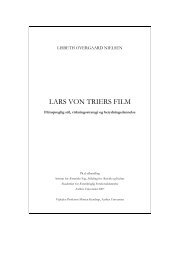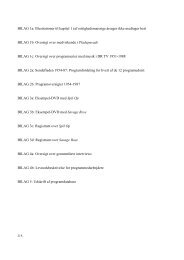The Jeremiad Over Journalism
The Jeremiad Over Journalism
The Jeremiad Over Journalism
Create successful ePaper yourself
Turn your PDF publications into a flip-book with our unique Google optimized e-Paper software.
Schlüter, ― could as of yet only dream of.‖ Second of all, the information that USIA sent out in<br />
Europe was illegal to distribute in the United States. 360<br />
However, bitter complaints over Jakobsen‘s article, and discussion over USIA‘s role in Denmark,<br />
was published in the four subsequent issues of Journalisten. Danish journalists‘ letters-to-the-editor<br />
argued that direct information feeds from the United States was no different than what was received<br />
in the form of other press releases, and that Danish journalists could critically sift through the<br />
information presented to them. 361<br />
A few year later, and in a different context, freelance journalist Birthe Lauritsen, nevertheless made<br />
a distinction between information from private corporations and foreign powers. In an article<br />
discussing Danish journalists‘ alleged public relations work for Israel and Oman, Lauritsen argued,<br />
―I think it is disturbing enough that journalists do paid PR-work for companies they also cover<br />
in their media outlets, because even if they can differentiate between one thing and the other,<br />
it can leave a different impression among the readers/listeners/viewers that the journalistic<br />
credibility is at the level of politicians. Ugh. It is, however, totally mistaken when we run<br />
errands for foreign powers.‖ 362<br />
To journalists like Jakobsen and Lauritsen the information provided by USIA thereby raised three<br />
potential problems. For one the American government with the USIA-printers got more direct<br />
access to Danish newsrooms than the Danish government. Second, the information providede by<br />
USIA was illegal within American borders but distributed freely in Denmark. Third, for some a<br />
distinction should potentially be made between information flowing from private companies and<br />
information flowing from foreign powers. 363<br />
360 Ibid. Page 5. See also John M. Crewdson and Joseph B. Treaster, "Worldwide Propaganda Network Built by the<br />
C.I.A.," <strong>The</strong> New York Times, December 26, 1977. Page 1.<br />
361 See for example Otto Jensen, "No One Out!," Journalisten, May 4, 1988. Page 24.<br />
362 Birthe Lauritsen, "For Fremmede Magter [for Foreign Powers]," Journalisten, March 24 1993. Back page.<br />
363 <strong>The</strong> relationship between journalists and intelligence officers was also problematized in the American press where it<br />
was argued that it was acceptable for journalists to seek information for intelligence officers, but that the journalists<br />
should draw the line if the intelligence officer attempted to solicit information as well. Terence Smith, "C.I.A. Contacts<br />
with Reporters: Officials and Newsmen Call Method Legitimate," <strong>The</strong> New York Times, December 25, 1977. Page 13.<br />
111


